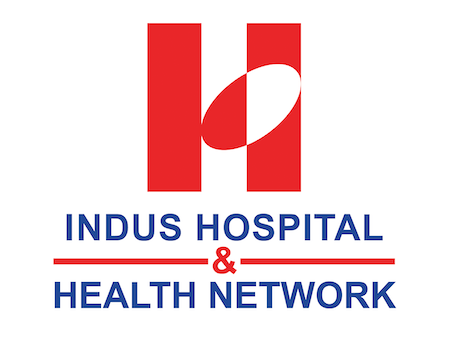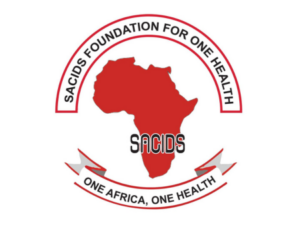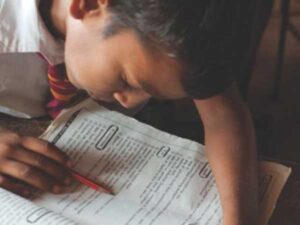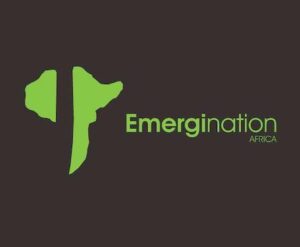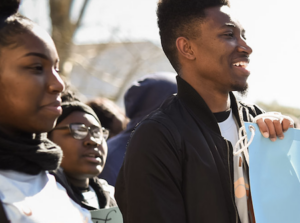Indus Hospital and Health Network is made up of a nationwide healthcare network of primary, secondary, and tertiary healthcare facilities across Pakistan. The network offers healthcare services to all patients completely free of cost.
Dr. Abdul Bari Khan and Syed Mashhood Rizvi of Indus Hospital & Health Network spoke with Alec Saelens on December 14, 2023. Click here to read the full conversation with insights highlighted.
Alec Saelens: Can you please introduce yourselves and describe your organization and the problem that you are working to solve?
Syed Mashhood Rizvi: Thank you for this wonderful opportunity to share our lessons, our successes, and even our failures. My name is Syed Mashhood Rizvi. I am the executive director for research generation and partnerships at Indus Hospital and Health Network. In addition to that, I have the honor and the privilege of being the chief of staff to our president, who is also present on this call, Dr. Abdul Bari Khan. He is the dreamer, and the founder, of what today is widely known as Indus Hospital and Health Network.
Indus Hospital was established in 2007, and we were the first hospital in Pakistan to be established on the line of technological innovation. We were also the first hospital in the country to be cashless and paperless. Our vision has always been to combine health with environmental consideration, even when environmental challenges were not at the forefront of the ecosystem of social justice and social development.
Dr. Bari, who is a cardiac surgeon, was always deeply concerned with the fact that healthcare, like other privileges in Pakistan, was proving to be an almost insurmountable challenge when it came to the provision of quality healthcare for poor people. He founded Indus Hospital with three of his friends, who were also physicians. They conceptualized a tertiary care hospital because that’s where the most cost-intensive provisions of healthcare exist in Pakistan. [The high cost] actually eliminates provision of healthcare to more than 90% of the people of Pakistan.
During the process of establishing Indus Hospital, Dr. Bari and his colleagues realized that hospitals are never going to be an adequate answer to the healthcare challenges in Pakistan. They had to move into reducing the burden of disease at the community level. Thereby, we started to create innovations at the primary and prevention center level, so that the overall burden on our hospital, which was free and has continued to be free for the past 15 and a half years, is reduced, and people can still get very high-quality, innovative healthcare at the primary level.
That’s where we ended up working with Skoll. The investment that Skoll made into the provision of healthcare, both at the primary and tertiary level, continues to be highly impactful for the provision of very sophisticated and high-quality healthcare for the people of Karachi, which is one of the largest cosmopolitan cities in the world. It ranges somewhere from the third to the seventh largest city in the world, and it is the fastest-growing city in the world in terms of the migration pool. The infrastructure of Karachi, particularly the healthcare infrastructure, is always facing huge loads of patients. Therefore, we also have embarked on establishing Pakistan’s largest free, not-for-profit sector hospital, which will have 1,350 beds. The problem that we’re addressing is manifold. That is why the strategic plan that we have for the next 15 years is as well-rounded as it can get.
There are six distinct areas addressing the problem of healthcare, keeping it at the center of everything and attacking it from different perspectives, so that the people of Pakistan have at least the possibility of being treated with dignity and respect, and their constitutional right to the provision of high-quality healthcare is somewhat met. Our number one thrust of the strategic plan is the provision of primary and preventive healthcare, and we are moving very fast on that front. Overall, we are geared towards more innovation in the area of prevention and primary healthcare. In terms of the use of technology, we have moved into the realm of telehealth care, mobile clinics, and container clinics, which were established with the help of Skoll Foundation.
Number two, we cannot ignore the large infrastructure of secondary hospitals established by different governments in our 76 years of existence. When we go into public-private partnership with any provincial government or federal government, we enter into a management agreement whereby our knowledge, expertise, and above all value system of being free and high-quality healthcare is installed. We can then hand those hospitals back to the government for them to continue to operate at a very decent level, if not a very high level, of provision of healthcare.
Number three, we are very dedicated and devoted to one of the major challenges of healthcare in Pakistan: the provision of human capital, which is required not only by tertiary doctors [and specialists], but by pharmacists, public health experts, and paramedics, along with people who are in medical technology. We are running Indus University of Health Sciences [to train more qualified health professionals]. At the moment, four out of our seven schools are fully operational, and in the next three years our medical school, our dental school, and our school of pharmacy will also become operational.
We have our eyes set particularly on the rural areas of Pakistan because as soon as you move out of the urban, peri-urban, and semi-urban Pakistan, human capital takes a nosedive. There may be hospitals and primary care clinics, but there is nobody to run them. People are just not equipped to deal with those kinds of problems.
Number four, we are into R&D, research and development, and Dr. Bari will share some of the cutting-edge innovations in healthcare that we have been working on. We are very serious about developing this region’s largest R&D center of excellence so we can share our knowledge and learn from the world in terms of best practices. One of the areas that we are very critically looking at is the environmental aspect of health, particularly when it comes to environmental disasters such as floods, or people in Lahore being unable to breathe as a result of pollution and smoke. What is healthcare doing to prevent rather than just treat those issues?
Number five, we are into multi-sectoral approaches. We realize that health alone is not the answer, nor is it the problem of communities at the grass-root level. [There are issues of proper] food and nutrition, provision of safe water, female empowerment and addressing issues of sexual abuse and harassment and violence. All these aspects have a cross-cutting element of mental health and [access to mental health support,] which is pivotal to our portfolio. We realize that we have to become multi-sectoral. We have to align ourselves with sustainable development goals. We are the only health network checking 14 out of 17 sustainable development goals in terms of Indus Hospital and Health Network taking concrete measures [to achieve a] holistic community uplift and create a very strong safety net around the three most vulnerable segments of society: women, children, and elders.
Lastly, we very actively pursue alliances and partnerships. We know that we may be doing remarkable work, but there are many other organizations in the world that we can learn from. So we very actively pursue knowledge-based partnerships. That is why we were very excited, both of us, to embark on this interview. We want to share with the world what we are doing and learn where we can improve and how else we can be in partnerships with other organizations.
In conclusion, the problem of healthcare in Pakistan for vulnerable segments of society is a very complex one. It doesn’t have a simple solution forward. Hospitals alone, primary care prevention alone, can only bring you from point A to point B. Unless you have a holistic approach that addresses elements of societal deprivation in terms of social justice, you cannot truly do justice to your own efforts. That’s what we try and do 24/7, 365.
Dr Abdul Bari Khan: My name is Inn Dr. Abdul Bari Khan, and I am a cardiac surgeon by profession. I was trained in a public sector hospital. I was at Dow Medical College, one of the oldest pre-partition medical colleges in Karachi, which is attached to a civil hospital, meaning a public sector hospital. It’s the largest hospital in Pakistan, with 1700 beds, and the poorest of the poor used to come there because we had the only beds and doctors available. Everything else was out of pocket.
Every patient coming there from the interior of Pakistan had a story. Someone was selling their cows, their goats, their livelihoods, their house, just to get a simple operation for their loved one. I’ve heard many parents say, “Let him die,” because losing one saves eight back home. These incidents were not happening in tens; they were happening in thousands, hundreds of thousands.
As students of Dow Medical College, we established an organization by the name of Patients’ Welfare Association, where we collected donations and used them to provide medicine and to buy blood for these patients. At that time, which was 1980/1981, the source of blood was largely “professional donors,” drug addicts who used to sell their blood so they could feed their addictions. They used to sell their blood once or twice a week. They had everything in their blood except blood: hepatitis, malaria, syphilis. In 1981, they went on a strike to increase the pay they got for their blood.
This caused chaos in the city. Many patients died. We convinced our fellow students to donate blood, but that strike was a blessing in disguise. We thought, “We can’t be hostage to these people,” and in 1982, we established the first voluntary blood bank in this country. I was the project director of that blood bank when I was a second-year medical student. Initially, it was a very difficult task to convince people to donate blood. When a patient came to the hospital, there were often about 50 attendants with them. But when you asked for blood, no one was there. At that time, if we got one or two units a day, we would have a party. Now the same blood bank is still run by the students of Dow Medical College. It delivers 275 units a day. Professional donors were eliminated, and it was all clean blood. There was no concept of components of blood.
In 1984, we brought the first machines from Germany over, and I went to Germany for my training. I was a fourth-year medical student, and I got trained on making components of blood. I trained other people, who then took over from there. 1986 was the first terrorist attack in downtown Karachi, where 75 people died, and about 400 people were injured. I had just graduated, and I was doing my internship. I still remember digging out injured people from [the rubble.] One good thing happened: there were long queues of people lining up outside the emergency department, waiting to donate blood. There were many people with bags of money telling us, “Whatever you need, we are going to provide.” I realized the Pakistani Nation is a great nation.
When we got over this crisis, we decided to rebuild the emergency department of Civil Hospital Karachi, and we asked one of the leading architects to make a plan for a hundred-bed emergency department. At that time, the budget was 3.6 million rupees, and for the first time, we used school kids [to raise funds.] We gave them money boxes, and 2.4 out of 3.6 million rupees were raised by school children. In a year’s time, the hospital was completed, and a day before the inauguration, I said to my colleague, “One day, we’ll make a hospital that will provide quality care and will be free of charge.” That dream was conceived in 1987, and it was realized in 2007.
I had a vision to be a cardiac surgeon because at that time, there were only two cardiac surgeons in Karachi. There was only one hospital that provided cardiac surgical services to poor patients, so there was a long queue of patients. Three years was the minimum wait, and we knew half of them would not come back. In three months’ time, we collected about a hundred million rupees, added two [operating] theaters, and doubled the capacity of the ICU; the wait list came down to six months. In 1995, I did my fellowship in cardiac surgery. I was appointed as an assistant professor of cardiac surgery at my alma mater, Dow Medical College. I started collecting donations to establish a cardiac surgery [department] because I was told by this government that there was no funding for cardiac surgery for the next three years. We raised almost 150 million rupees and established cardiac surgery. In 2000, [we performed our first] open heart surgery, and we have done 10,500 open heart surgeries since, all free of cost.
In 2007, we had realized our hospital, but people were skeptical that because we had no money, we would start charging patients within the year. The only strength was our faith in God, and that God would help us get it done. Sixteen years later, we have 16 hospitals and primary care and public health facilities in fifty-one districts of Pakistan. On a monthly basis, we impact about half a million patients, which is 6 million people a year. My first-year budget was about a hundred million rupees; now it is about 180 million rupees. And this is only the operational budget.
We are expanding in primary healthcare. We have boat clinics because people in rural areas don’t have good access to healthcare. There is no organized healthcare health system starting from primary care then referring to secondary care and tertiary care. Patients from anywhere can come over and get treatment in any Pakistani hospital; there is no organized catchment area. So we decided to make one. Many of our patients live in the northern part of Pakistan, in the mountains, and just to reach the main road, it takes about eight to 10 hours. People lift a pregnant lady on their shoulders, and by the time they reach the door, mother and child are gone. These are not only one or two people; these are hundreds and thousands of people. This was the main reason why we wanted to train people; we wanted to provide accessible and equitable healthcare to all.
Alec Saelens: Thank you for providing all that deep history and for providing the strategic pillars of your organization. The first question that comes to my mind is how are you able to provide free care? What’s the business model? Where does the money come from to sustain yourselves?
Syed Mashhood Rizvi: We benefit from one of the core religious pillars of Islam, which is called Zakat. It is a religious obligation that you must take 2.5% of your earnings and your assets for community well-being, and direct it towards institutions you trust or towards the most vulnerable aspects of the population. Pakistanis gave 300 billion rupees in Zakat, which was recorded in a report by the Pakistan Center for Philanthropy. They’re a very renowned institution in Pakistan that regulates and builds the capacity of the nonprofit sector. We benefit from Zakat, and as we are operating in a predominantly Muslim country, it is one of our biggest sources of income, for lack of a better word, or revenue stream.
Number two, we get donations all year long. (Zakat is mostly taken out in the holy month of Ramadan.) Number three, we are the recipient of government grants because in many ways, we are performing their constitutional duty. We enter into two agreements: a management agreement and a grant agreement. The management agreement pertains to the fact that when we are running their facilities and they provide us with the financing, we provide them with the services. When it comes to the grant agreement, that pertains to our own facilities, and the government chips in. So the government supports around 30% of our entire budget, and 70% we raise ourselves.
Another pillar of revenue is our international and local grants. We are the largest recipient of the malaria grant from the Global Fund. We have also received international grants addressing the problem of tuberculosis in Pakistan in the past. After we are done with this interview, we are rushing to an event to celebrate our work and 16 days of activism for protecting the rights of women from the UNFPA [United Nations Population Fund] grant, as well as the work that we did during the floods and we continue to do after the floods. There are small and medium grants that we can continue to receive as we continue to expand our footprint. We have a very large network of international charities, which we have registered in countries in North America, in Europe, in the Far East. We also have chapters that we call friends of Indus Hospital. They are independent charities, but their main mandate is to raise funds for Indus Hospital and also to identify potential partnerships for Indus Hospital. We raise around $30 million a year internationally.
This is how we are able to sustain ourselves. We have a very significant movement towards creating a sizable endowment fund, and there are many people internationally and locally who are beginning to donate their property and their assets to us. We feel that in 10 years time, around 25% to 30% of our overall expenditure will be covered by the endowment proceeds. Our university is need-blind. It’s a tuition-free, self-sustaining model. On top of that, we are into the creation of health innovations, and we are hoping that those will add to our overall financial business model.
We are also entering into business-to-business ventures. In Pakistan, the regulatory body for large industries, be they private sector or public sector, must run certain diagnostics for their employees in order to arrest the problem of any infectious disease and also to promote the well-being of their staff. Very recently, we received the region’s first-ever certification for lab services. We received the American Association Certification for our blood center, and we are just a few days away from cap registration, which is the most sought-after accreditation in the world for lab services.
Dr Abdul Bari Khan: The College of American Pathology, basically.
Syed Mashhood Rizvi: We have started to gain certain revenue streams as a result of our B2B [business-to-business] services, and we work to ensure that our main customers, the most underprivileged of our society, are not confused in any way to think we are beginning to charge for our services. The government in Pakistan is also moving towards universal healthcare coverage, which will entail insurance companies to kick in, for the private sector in particular. Where our grants will continue to be in place, many of our patients, if not all of our patients, will have insurance coverage. They will never see a health bill. It doesn’t compromise our core value system of never issuing a bill to the patient. We will then begin to build the insurance companies and enter into an agreement with the government, which will further substantiate our sustainability for the future.
The business model is very creative because we are one of a kind. If not the model, at least the size of it. The progression that Dr. Bari explained to you is truly exponential, and if we look at any other organization in the world, Emirates Airlines is the only example that I can give you [of an organization that] expanded as fast as we did. We have to see how we are going to sustain it, so we are taking all these measures, and we are expanding not only the measures but also the base and means of our overall support system. The creation of a community of supporters, in Pakistan and globally, continues to enhance our network. As far as our donor elasticity is concerned, we have increased it by 34%, consistently, every year for the past five years. We have increased our donor base by 50% every year for the past five years. For economies of scale, as a business model, as well as for large-scale sport, we are moving in both directions.
Dr Abdul Bari Khan: I was the founder and CEO for the last 15 years, and last year we appointed a new CEO so that the continuity is there, the system is sustainable, not dependent on the personality. It’s an organized healthcare system because we are not immortal, and [it will continue even when we are not there.] Last November, when I took over, we had some strategic plans that Mashhood elaborated on. Our other focus was how to make this organization sustainable. What happens next, or what comes after you, is a very frequently asked question, so we are looking into that. We are also now going into medical innovations. We have two new patents. One will be a game changer in ICU management, and the other one will impact infection control.
Many others are coming. We are working on a 360-degree approach to make this organization sustainable. I had one visitor today, and we were going through the main lab system, and there were a few things I saw myself [that could evolve]. We will be making most of the reagents that we use in our labs locally, which will save on cost and foreign exchange fees. Another thing that is very important, not the money, not the buildings, not the equipment, is HR, the human resources department. We need passionate and visionary people who can follow the steps that we have created.
Alec Saelens: You both radiate such amazing ethos and values; I can imagine people really appreciate following you as leaders. What do you think is most needed from other partners or actors who are aspiring to emulate the work that you’re doing to advance system-level change, with the objective of reaching sustainability? What are the teachable lessons, the insights that make what you’re doing so successful and potentially replicable?
Dr Abdul Bari Khan: First of all, clear vision, faith, role modeling, credibility, and transparency. If you have all these things, people know you can deliver. Why have we reached this point? Because we have a track record and it is spotless. These things are very important in preparing people to take it forward. It should be a group of people, not only one or two, so many are there to replace you when you are gone.
Syed Mashhood Rizvi: I agree. You need to have that conviction, that devotion and faith that Dr. Bari calls unshakeable. It hasn’t been easy for us, with the red tape and bureaucracy we deal with when it comes to the government. The erratic nature of the government in Pakistan creates a lack of stability, but you just continue to work at it and institutionalize your legacy. You don’t make it about you. We are called Indus Hospital, we are not called Dr. Abdul Bari Khan Health Trust, which would have been a much easier route for him to take. Many people in the world make it about themselves.
We created this in a manner that pushes us to lay the foundation of a legacy for centuries to come. We look at different institutions in the world, the likes of Harvard and Stanford, and nobody even remembers how they were created or who created them. But they are there, and they are formidable. Why can’t we also become that type of institution? That is why we are taking all those measures of creating a succession plan very openly and not unnerving people or donors in the process. We engage with them, and we make a stakeholder in that succession planning. The next generation is also part of our succession planning. So tomorrow, the next generation of one of our founding donors is visiting the hospital because the parents said that we are done, we did what we did for this hospital. Now it’s your time to support this institution.
Alec Saelens: That’s great. Do you have an example of how you’re doing that? How do you create that succession planning and mobilization?
Syed Mashhood Rizvi: If you were to Google St. Jude’s Children’s Cancer Hospital, it’s in Memphis, in the US. It’s almost five decades old, and the founder is long gone, but it grows in strength and it is [renowned] amongst many other institutions. It has been an inspiration for us because their daily expenditure to treat children with cancer, along with R&D, is $1.8 million, and they raise $2.3 million every day. How do they do it? They have a cultivated community of 1.5 million volunteers and donors who give from $17 to $30 every month. That is their lion’s share of expenditure. Not only that, they have a $10 billion endowment fund which then goes into their R&D. About three decades ago, Harvard University went into a state of financial crunch and almost faced bankruptcy. The president of Harvard was approached by the wealthiest of the United States families, and they each offered Harvard $5 billion. She said no. She said, “I would rather have $1 billion from 500,000 people than $5 billion from one person.”
Dr. Bari has discovered where the true answer to our sustainability, as well as our future planning, lies. He is so remarkably respected by the local, regional, and global community that we have been able to cultivate both a digital and physical community of supporters. His challenge, which I’m acutely aware of being his chief of staff, is how to replicate the passion in the next generation of doctors and paramedics. I’m not saying that it’s not there, but it’s a very different world that we operate in today. The social upbringing, the parental upbringing, and the educational upbringing that Dr. Bari and [his generation received is very different from the upbringing young people receive today, especially with] the advent of social media.
That is why we are establishing the university, which should become the main feeder system of [the hospital and create] continuity of the same passion. Dr. Bari hopes to inspire an even stronger passion in those who are going to be at the helm of affairs of Indus Hospital and Health Network.
Dr Abdul Bari Khan: In addition, the Patients’ Welfare Association creates a continuous supply of [dedicated professionals.] We used to think that the Patients’ Welfare Association was [designed mainly to] provide blood to poor patients. No. It is an institution that has developed me and many more like me, who are doing good work in their professional lives. That organization will be continuously sending in passionate people. The other thing we have started is a volunteer program in the hospital. We have a summer program and a winter program. For example, we have two consultants working at Indus Hospital who volunteered at the hospital through the summer camps and the winter camps when they were in school. When they became doctors, they joined the hospital for their fellowship. They used to collect donations for us, and they were passionate about the patients. They have been involved in the whole system.
Alec Saelens: That speaks to the community and the belief that you’re creating, as well as to the importance of your work. This has been fabulous. Thank you so much.
Click here to read the full conversation with insights highlighted.
Alec Saelens is a former journalist who supports SJN and its partners track solutions journalism’s impact on society and the industry. In his former role, he researched and consulted on the connection between solutions journalism and revenue. He is co-founder of The Bristol Cable, the UK’s pioneering local media cooperative. Before SJN, he was a researcher and coach for the Membership Puzzle Project and an analyst for NewsGuard.
* This interview has been edited and condensed.
Learn about other organizations that provide social innovations in healthcare.

